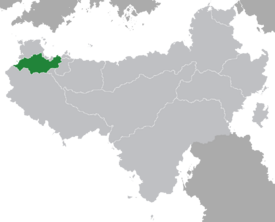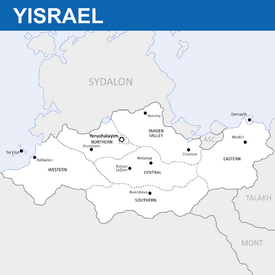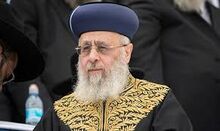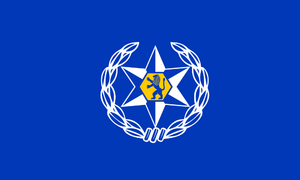Yisrael
This article is incomplete because it is pending further input from participants, or it is a work-in-progress by one author. Please comment on this article's talk page to share your input, comments and questions. Note: To contribute to this article, you may need to seek help from the author(s) of this page. |
The Kingdom of Yisrael Malchus Yisroel | |
|---|---|
 Yisrael (light green) in Scipia | |
 Map of Yisrael with internal borders drawn, including major cities. | |
| Capital | Yerushalayim |
| Largest | Dervaylik |
| Official languages | Allamunnic English Yiddish Modern Hebrew |
| Ethnic groups | Jews |
| Demonym(s) | Yisraeli |
| Government | Federal presidential constitutional monarchy |
• HRM King | Hezekiah III |
| Yitzchok Katz (RC) | |
| Binyamin Goldschmidt (RC) | |
| Proclamation of the Kingdom of Yisrael | |
| circa 1713-1715 | |
| 1715 | |
| November 4th, 1919 | |
| September 3rd, 1920 | |
| circa 1950 - 1951 | |
| January 1st, 1974 | |
| Area | |
• | 150,304 sq mi (389,290 km2) |
| Population | |
• 2020 estimate | 21,388,600 |
• 2010 census | 18.76 million |
| GDP (nominal) | 2020 estimate |
• Total | $892.92 billion |
• Per capita | $41,794.22 |
| Gini (2016) | 43.2 medium |
| HDI (2016) | 0.913 very high |
| Currency | Yisraeli new shekel ($) |
| Time zone | West Scipian Time (WST) |
| Date format | mm/dd/yyyy CE |
| Internet TLD | right |
The Kingdom of Yisrael (commonly called Yisrael) is a federal presidential constitutional monarchy in the world.
The Kingdom is an nation-state located in the continent of Scipia. Yisrael borders Sydalon to the north, the Thalassan Ocean to the west, the Periclean Sea and country of Ascalzar to the far northeast, Talakh to the east, and Mont to the southeast. At 150,304 km2 and with 21.4 million people, it is one of the smaller nations in the world by both land and population.
Yisrael is the home of world Jewry and was founded as a Jewish nation-state. The kings of Yisrael are reputed to trace their lineages to the last kings of ancient Israel. It is considered the holy land for Jews and is also sacred by Christians, although the Christian holy land is nearby in Sydalon.
The Kingdom was preceded by the Grand Duchy of Yisrael and earlier by the Jewish petty states. For much of its history, it has been largely under foreign control, vassalage, or partial occupation. From the 18th century onward, it has developed a centuries-long rivalry with neighboring Sydalon, a Christian Crusader state which has asserted historical claims to the Yarden River Valley. Sydalon and Yisrael fought a series of wars with each other throughout the 20th century, before signing the Yarden Accords in 1973, turning a cold war into a cold peace. Since 2000, the nations have developed warmer, more cordial relations. From the mid-1970s, Yisrael has been beset by pro-Sydalene Christian terrorism following the Accords; however, since 2019, the terror campaign has been increasingly thwarted, leading to the first year without a successful terrorist attack since 1975.
Since the 1970s, Yisrael has developed a globalizing post-industrial economy that has consistently raised Northwest Scipia's economic profile. The banking sector in Yisrael is considered a regional and global policy-setter. Because of secretive banking laws and low, favorable tax rates, Yisrael has become a tax haven for numerous global elites, especially from Fahran, Ghant, Onekawa-Nukanoa, and the Jewish diaspora, earning the nickname "Banker of Scipia." Yisrael has membership in the Forum of Nations and the Periclean Pact (as an associate member), as well as broadly being considered apart of the Western Monarchies geopolitical bloc in the international community.
Etymology
The names Land of Yisrael and Children of Yisrael have historically been used to refer to the biblical Kingdom of Yisrael and the entire Jewish people, respectively. The name "Yisrael" (Modern Hebrew: Yisraʾel, lit. "struggle with G-d") in these phrases refers to the patriarch Yaakov who, according to the Hebrew Bible, was given the name after he successfully wrestled with an angel of G-d. Yaakov's twelve sons became the ancestors of the Yisraelites. Yaakov and his sons had lived in Kenaan but were forced by famine to go into Mitzrayim for four generations, lasting 430 years, until Moshe, a great-great grandson of Yaakov, led the Yisraelites back into Kenaan during the "Shemos" (Exodus).
The area is also known as the Holy Land, being holy for all Abrahamic religions including Judaism and Christianity.
History
Government and politics
Yisrael is a federal presidential constitutional monarchy whose structure arose from the 1919 Revolution, after which constitutionalist liberal reformers created and passed the 1920 Constitution, ending the absolute monarchy. This form of government was significantly modified in the Royal Reform Acts of 1952 in the aftermath of the Year of Blood.
There are three branches of government purposefully designed to ensure that the King has substantive executive authority that is tempered by a system of checks and balances with the President of Yisrael, the Royal Knesset, and the royal judiciary each possessing concentrations of responsibilities to counter abuse by either the monarch or the elected government. This division of power, duties, obligations, and responsibilities are outlined in the Royal Constitution, which is considered the supreme law of the land throughout Yisrael.
Branches of government
His Majesty's Royal Government of Yisrael, similar to most modern nation-states, consists of three branches: executive, legislative, and judicial.
Executive


The executive powers are divided between His Royal Majesty the King and the elected His Excellency the President. The King is the head of state by his hereditary right to rule and is formally the royal commander-in-chief of the armed forces and the national representative of the Yisraeli people. The executive head of government of the Kingdom is the President, who is aided in his administration of the royal bureaucracy by the Cabinet, who are appointed by and serve at the President's pleasure. The reigning King is Hezekiah III. The current President is Yitzchok Katz.
Since the Royal Reform Acts of 1952, the President has been endowed by His Majesty as the military Supreme Commander, making the President the effective commander-in-chief of the Royal Yisraeli Defense Forces on a day-to-day basis. However, since January 2020, the King has declared the 1952 Acts as they relate to his powers null and void, ending this de facto transfer of C-in-C powers to the President. The King has broader political powers than is typical in most constitutional monarchies, including an array of reserve powers and the ability to give or refuse royal assent.
The President also has the power to sign or veto legislative bills passed by the Knesset. He appoints his Cabinet as well as a bevy of senior and mid-level administrative and regulatory posts throughout the Royal Government. The King may override this with a royal counter-veto.
The president serves a term of four years, and cannot run more than twice, and both the president and vice president must run on the same ticket. The president is elected through a plurality majority in an electoral college, whose votes are decided by the winner of the popular vote in each of the eight districts by eligible, registered voters in a first-past-the-post electoral system.
Cabinet
| Ministry | Minister | Party |
|---|---|---|
| President | Yitzchok Katz | RC |
| Vice-President | Gershon Blau | RC |
| Foreign Minister | Ariel Goldblatt | RC |
| Defense Minister | Naftali Bauman | RC |
| Justice Minister | David Roth | RC |
| Interior Minister | David Touro | LNJ |
| Finance Minister | Alexander Keisenberg | RC |
| Transportation Minister | Yehudis Eisenberger | RC |
| Immigration Minister | Avrohom Abadi | RC |
| Education Minister | Tuvia Abramowitz | TA |
| Religious Affairs Minister | Yoshiyahu Siegel | TA |
| Economic Development Minister | Mendel Feinstein | AFY |
| King's Minister | Prince Michoel | Nonpartisan |
Legislative
The legislative branch of the Royal Government consists of the unicameral Royal Knesset. The Knesset, collectively, is charged with lawmaking, declaring war or authorizing military force, the power of the purse, creating or eliminating public services, the oversight, investigation, and impeachment of sitting government officials, ratifying treaties, and providing the advise and consent for presidential appointments.
The Knesset consists of 142 members. Each member serves a two-year term with the ability to run for re-election indefinitely without term limits.
Judiciary
In Yisrael, the court system is divided between religious and secular courts. Secular courts mainly deal with general societal laws (both civil and criminal) while there exists a state-sponsored confessional system for religious courts depending on the person's religious faith. Most religious courts, as reflecting the majority of the Kingdom, are Jewish courts. A smaller structure of sectarian Christian religious courts exist for specific non-Jewish populations and their individual religious traditions.
A non-practicing or secular person is required to attend to a case in a religious court of the faith of his familial upbringing; barring that or in extraordinary cases, a person may appeal and transfer their case to the Royal Yisraeli Special Court of Last Resort, an ad hoc court consisting of a select panel of Sanhedrin judges who decide which law to apply and try the case.
The Royal Yisraeli Sanhedrin is the supreme court of Yisrael. It is a properly constituted Jewish religious court (beis din) that is the final authority over all religious and secular legal disputes. It is comprised of 71 judges (dayanim), who are all Torah scholars who are well-recognized as the most revered and learned Jewish legal decisors of their generation.
The secular Yisraeli courts are referred to as the Royal Yisraeli General Courts, with courts at the district and royal levels, including an appellate division. It handles secular civil and criminal law. The highest court in this system under the Sanhedrin is the High Appellate Court.
The religious Yisraeli courts for Jews are referred to as the Royal Yisraeli Jewish Courts, and similar to their secular counterparts, exist at the district and royal levels, but also at the local level. They are overseen by the Sanhedrin and the Chief Rabbinate of Yisrael. The non-Jewish courts are referred to officially as the Royal Yisraeli Non-Jewish Courts and are officially administered by their respective religious authorities under nominal supervision by the Ministry of Justice.
Other courts
There exists a litany of Special Royal Courts, including:
- Royal Yisraeli Special Court on Political Crimes and Corruption,
- Royal Yisraeli Court for Moral Crimes (for serious religious crimes),
- Royal Yisraeli Bankruptcy Court
- Royal Yisraeli Tax Court
- Royal Yisraeli Special Court of Last Resort
Politics
Yisrael has a de jure multiparty system but a de facto two-party system. The right-wing Royalist Conservatives and the center-left Constitutional Liberals dominate Yisraeli politics, but given the fractious nature of Yisraeli life, a number of minor and third parties are able to gain the loyalties of certain constituencies through bloc voting and enter the Knesset, forcing the major two parties to often form coalitions to govern effectively.
However, since the ongoing Centrist Revolt (2019 - present), the formerly "leading party of the left" the Con-Libs have been displaced by the Alternative for Yisrael-led United Center Bloc, which is currently the chief political opposition in the Knesset after the 2020 elections.
Foreign relations
Yisrael recognizes and maintains embassy-level foreign relations with most states in the world. The Kingdom has special relationship with Arthurista, and is on a friendly or cordial status with a litany of other countries, including many of its immediate neighbors such as Sydalon and Talakh, as well as most of Belisaria, most of Northumbria, and parts of Oxidentale. The nation has few ties to the Eastern continent of Ochran and Malaio, with the notable exception of Onekawa-Nukanoa (of which it has over a century's worth of shared history), but in recent decades as Yisraeli trade relationships and tourism has grown, the Kingdom has opened embassies in some of the more prominent states located there, including Tsurushima.
Yisrael pursues a foreign policy based in part on ideology and in part on national interests.
However, there are several nations that Yisrael does not recognize or have diplomatic relations with (or has indirect relations with), including Mutul, North Ottonia, Ostrozava, Valgtea, and the Skaldafen Confederation.
Wars
Yisrael has been involved in a number of wars and military conflicts, starting with its victory in the First West Scipian War that sparked the created of the kingdom of Yisrael from a grand duchy and continuing until the 21st century.
Military
Royal Defense Forces
The Royal Yisraeli Defense Forces consist of four military services: the Army, the Navy, the Air Force, and the Border Guard. Currently, the Yisraeli military is comprised of approximately 1.24 million active and reserve personnel.
The Defense Forces are largely deployed to fight a hypothetical two-front war given its regional security situation, with a legacy hostile power in Sydalon (since 1973, a cordial power), and potential hostile powers in the Periclean basin. Consequently, the Sydalon, Ascalzar, and to a lesser extent (for geopolitical and climatic reasons) the Mont borders are all militarized. Because of this, the Border Guard was militarized and made a part of the Defense Forces in the Royal Reform Acts of 1952.
Intelligence
The Royal Yisraeli Intelligence Service is the Kingdom's primary foreign intelligence service whose jurisdiction is largely overseas. In contrast, the Royal Yisraeli Security Service is an internal security service as well as a domestic intelligence and counterintelligence agency that is mandated to protect the safety of the Government of Yisrael inside its borders.
Law enforcement
In Yisrael, law enforcement is split along royal (national), district, and municipal levels. The regular Yisraeli Police exist as independent police agencies at the district and local level, with no central royal authority. Rather, they are overseen by district governors and city and town mayors, respectively.
On the national level, there are several special royal police forces. The Royal Yisraeli Special Political Police pursues ideological and political crimes and answers directly to the King. The Royal Yisraeli Civil Guard is a special religious police force that pursues a number of religious-specific crimes.
Administrative divisions
Yisrael is divided into eight districts, including a special district: the Northern District, Dervaylik District, Central District, Western District, Southern District, Yerushalayim District, Eastern District, and Yarden Valley Special District.
Two of the mehozos (districts) consist of just a major metropolitan city and its surrounding suburbs (Yerushalayim and Dervaylik), while four districts - Northern, Eastern, Western, and Yarden Valley - are part of Outer Yisrael, which permits a greater degree of security and military control over civilian authorities.
| District | District Capital | Population | Largest City |
|---|---|---|---|
| Northern District | Shomrom | 454,098 | Natzras |
| Dervaylik District | Dervaylik | 1,302,885 | Dervaylik |
| Central District | Netanya | 6,874,231 | Rishon LeZion |
| Western District | Tel Eilat | 5,412,976 | Ashkelon |
| Southern District | Beersheva | 881,935 | Beersheva |
| Yerushalayim District | Yerushalayim | 1,431,566 | Yerushalayim |
| Eastern District | Modiin | 3,483,677 | Modiin |
| Yarden Valley Special District | Yericho | 632,713 | Chevron |
Economy
Geography and climate
Geography
Yisrael is geographically diverse, traversing a number of different geologic classifications. It is bounded in the northeast and west by the Thalassan Ocean, in the far north by the Judean Mountains abutting Sydalone, and arid and semi-arid desert in the south/far south bordering Mont and Talakh. In the country's center are fertile temperate plains.
The Great Dry Desert lies to the southern reaches of the nation, while the far north is marked by a mountainous plateau punctuated by several water systems - the Great Salt Sea, the Kinneres, and the Yarden River.
Climate
The climate in Yisrael is extremely polarized, depending on the season, the location, and the geography. Northern Yisrael, from the Judean Mountains to the northern coast between the Sydalene Exclave and Ascalzar, is largely a cold-summer Mediterranean climate. This area has cool summers, cold-to-mild winters, and wetter, less dry spring and autumn. For example, Yerushalayim in the Judean plateau receives typically several snowfalls in the winter seasons.
This gives way in western and central Yisrael to hot summer Mediterranean climate, which has hot and dry summers and wet, mild winters. This corresponds well to the agricultural and tourism sectors, who thrive on the extended growing season and foreign tourist-packed beaches, respectively.
In the far south, the Great Dry Desert and cities such as Beersheva are located in a narrow strip of cold semi-arid desert biomes, which has moderately hot, dry summers, cool-to-cold winters, and very wet spring and autumns.
Because of the wide breath of climate locales in Yisrael, there exists several phytogeographic regions that produce over 3,000 types of plants and vegetables.
Wildlife
Likewise, Yisrael has extensive fauna in addition to flora due to its position between climatic extremes. Often, Yisrael is at the border of many species' territory. It hosts a number of Scipian and Belisarian mammals, invertebrates, fish, birds, reptiles, and amphibians.
Demographics
Major cities
| Rank | District | Pop. | Rank | District | Pop. | ||||
|---|---|---|---|---|---|---|---|---|---|
 Yerushalayim  Dervaylik |
1 | Yerushalayim | Yerushalayim | 989,508 | 11 | Rehovos | Central | 143,211 | Ashkelon  Modiin |
| 2 | Dervaylik | Dervaylik | 723,456 | 12 | Chevron | Yarden Valley | 135,002 | ||
| 3 | Ashkelon | Western | 398,671 | 13 | Shomrom | Northern | 128,774 | ||
| 4 | Modiin | Eastern | 362,976 | 14 | Natzras | Northern | 89,962 | ||
| 5 | Rishon LeZion | Central | 284,344 | 15 | Beis Shemesh | Central | 76,850 | ||
| 6 | Yishuv HaGadol | Central | 224,008 | 16 | Rehas | Southern | 69,874 | ||
| 7 | Ashdod | Eastern | 221,520 | 17 | Teveria | Northern | 54,115 | ||
| 8 | Netanya | Central | 215,077 | 18 | Yavne | Central | 46,890 | ||
| 9 | Beersheva | Southern | 210,341 | 19 | Beis LeChem | Northern | 43,876 | ||
| 10 | Bnei Brak | Western | 197,619 | 20 | Yericho | Yarden Valley | 35,623 | ||
Ethnic groups
Just over three-fourths (75%) of the country consists of Jews (of any background), while about a quarter (25%) are non-Jews, primarily Christians.
The largest ethnic group are Yisraeli Jews, who makeup 85.6% of the Jewish ethnic population, with the remaining consisting of immigrant or resident Jews of foreign birth. Among non-Yisraeli Jews, the majority hail from Sydalon or Latium's Perateia province.
In the Yisraeli Christian sector, the vast majority are Fabric Catholics, though there are dedicated smaller communities of Eastern Orthodox and Protestants (from Sudmark and Garima).
Languages
The official languages of Yisrael are Modern Hebrew and Allamunnic Anglic. Yiddish and Standard Latin are all major secondary and/or regional languages.
Education
Education in Yisrael is governed from a variety of sources, including the 1725 decree on education, the 1876 decree on education, and the revised 1922 Education Acts. The comprehensive education system is completely private, but supported with state subsidies and "community" regulations.
The educational system is three-tiered: primary education (grades 1–6, approximately ages 6–12), middle school (grades 7–9, approximately ages 12–15) and high school (grades 10–12, approximately ages 14–19). All three tiers are compulsory. The high school diploma is called a "Bagrut certificate."
For Yisraeli Jews, there are several options: Mamlachti Dati ("basic religious" schools), which are attended primarily by Chiloni and Masorti students, Chinuch Atzmai Dati ("independent religious" schools), further subdivided between the National Religious, Chardal, and Chareidi sectors, Chinuch HaGoyim ("non-Jewish" schools), which cater to the Christian and other non-Jewish population, as well as private international schools for foreign students or the students of foreign residents, e.g. Latin International Academy in Yerushalayim.
All schools have a national curriculum overseen by the Ministry of Education, with sectarian, local, and/or additional curricula depending on the school's location and sectarian affiliation. For example, in the Southern District, local regulations have added a dedicated geology and desert ecology courses to all of its schools. In Christian sector schools, while students learn about Jewish and biblical history, culture, and practices as do those in Jewish schools, they also have additional curricula geared towards the school's Christian affinity, including separate courses teaching about Christian theology, history, culture, philosophy, the "New Testament," and Yisraeli Christian practices and rites.
National law has established a "community school" regulation mandating that if a student has selected a particular track, he or she must be admitted by one of the schools with that affinity in his or her area, or by the sole school of that affiliation in that area, which ever is the situation. One example is if a family elects to send their child to the only Chareidi school in a jurisdiction, and if they meet all of its standard admittance requirements, that school must admit their child.
Annually, the Knesset appropriates about $8 billion shekels in private school subsidies, about 10% of the overall government budget.
Formerly, between 1954-1978, there existed a different national-school scheme where the government had a system of state schools, called simply Mamlachti, that were strictly secular and taught Jewish and Bible topics as a secular discipline, while permitting Dati (religious) sectors to operate their own schools with minimal state aid. A backlash occurred, amid the religious awakening in the aftermath of the Fourth West Scipian War (1963-66) as well as a cultural revolt to the increasing laxity and weakening of Jewish commitment among Yisraeli youth, led to the Schwartz administration to close the state school system and reorganize national education into state-supported private schools with unambiguous religious education in the late 1970s.
Health
Health care in Yisrael is provided largely by private sector for profit organizations that run health-care facilities, including hospitals, clinics, community health centers, ambulatory services, and medical schools. Government-owned health care entities are found almost exclusively in the Yisraeli military. There is mandatory private health insurance coverage, which is portable and individualized - unlike in some countries, where the insurance is provided by the employer, the employer pays for a plan of the employee's choosing, which stays with the employee whether or not he or she still works for their initial employer. Subsequent employers then take on paying the employee's health plan when they hire that worker. Consequently, after salary, negotiations over insurance plans remain the second-highest item in employer-employee job interviews.
The Government of Yisrael provides state subsidies to private health care networks, totaling $51.2 billion shekels in fiscal year 2020. This is just under 28% of the national budget, making health care costs one of the leading categories of government spending.
The Royal Yisraeli Defense Forces own most of their own military health care facilities, but contract with private health providers to primarily staff and run these facilities.
Religion
Tracking closely with ethnicity, 75% of Yisraelis are Jewish, while about 25% are another religion, usually some form of Christianity.
In the judicial and educational realm, the Yisraeli government has created "confessional" systems where non-Jews have schools that are affiliated with their ethno-religious affinity (including the flexibility to teach the values of that affinity with additional curricula) as well as be tried under its religious law in non-criminal matters.
Culture
Cuisine
Media
Yisrael has a robust and complex media environment, with dozens of newspapers, magazines, and radio stations, all of which contribute to an crucial role by the press in Yisraeli political, social, and cultural life.
There are over 9 languages in the media landscape, with Modern Hebrew and Allamunnic Anglic topping the list as the main languages. They are followed by Yiddish (among Chasidish Jews and other ethnic Belisarian Jews), Standard Latin (among papers and radios near the borders with Sydalon), and others.
The media market was competitive in the 1920s after the fall of the absolute monarchy, when a plethora of independent newspapers and radio stations emerged, but was curtailed under the nationalization of media and widespread censorship program under the Autocracy regime in the 1940s. The media market burst out again in the 1950s-90s, until the developing digital media trends began to put a number of smaller media outlets out of business. As of 2010, media in Yisrael is largely controlled by three media conglomerates.
The press in Yisrael is rated by the global Press Freedom Index has having "moderate problems," largely due to strong libel/slander laws, strong government control over state secrets and national security information, the prohibition on certain ideological and religious ideas, and the general politicized/partisan nature of many media outlets, who favor one political party or one sector of society over the other. Despite all this, Yisrael is still rated as #2 most free press in Scipia, behind Ascalzar, tied with Sydalon, and ahead of Lusittia, Abalessa, Gran Aligonia, Almadis, Tulura, and Talakh.
For a list of media organizations, see: List of media outlets in Yisrael.


